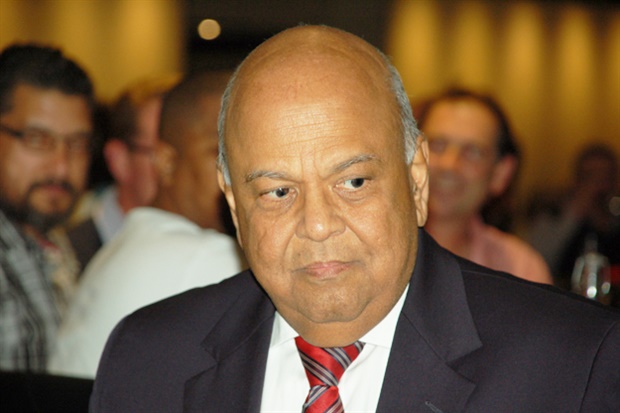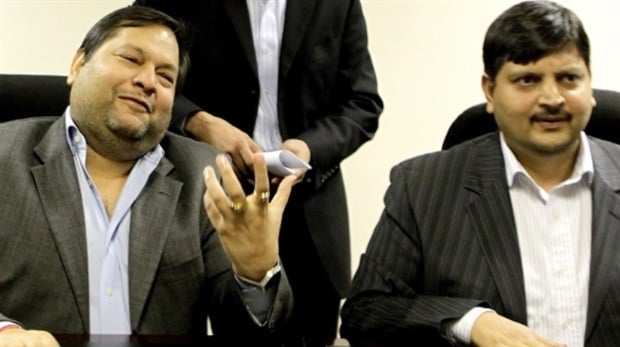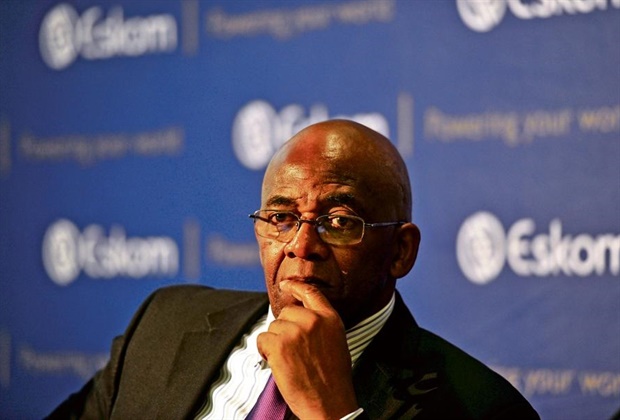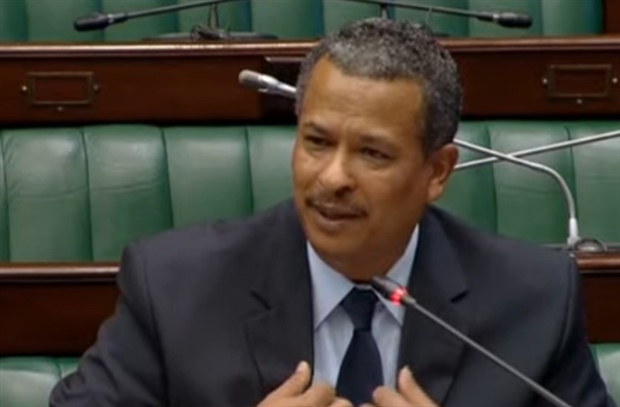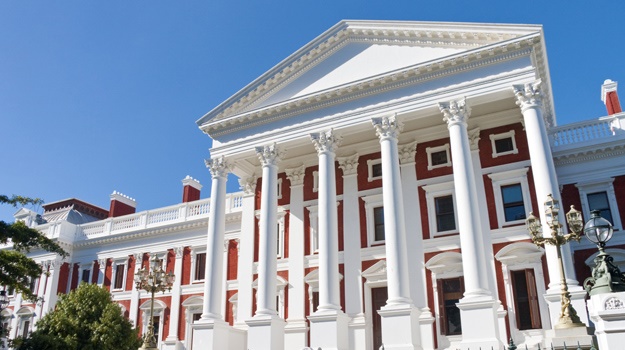
18 Oct 2017
WRAP #StateCapture: ‘Bring the crooks to book’
Former Eskom CEO Brian Dames and Outa’s head of energy Ted Blom testified before Parliament’s state capture inquiry focusing on Eskom on Wednesday.
Blom called on the inquiry to “bring the crooks to book”, while Dames said the inquiry “was too late”.
These were the seven key events from the day’s proceedings:
1. Dames warned things were in bad shape when he left in 2014
Dames said he warned Parliament that things were in bad shape at Eskom just before he left in 2014. “You are too late,” he said. “You should have done this a long time ago.”
Dames had a 27 year career at Eskom, where he started his career as a nuclear physicist at Koeberg nuclear power plant and worked his way from heading up coal power stations to becoming chief executive.
2. Gigaba’s Eskom board brought poor governance to Eskom – Dames
Dames claimed that former chairperson Zola Tsotsi directly interfered in procurement issues at Eskom from 2011, when a new board appointed by former public enterprises minister Malusi Gigaba appointed the board.
One of the issues concerned an audit rotation, which the board stalled for a few years when Dames was CEO.
Dames said he was concerned that Tsotsi arbitrarily cancelled the procurement process for auditors. “(The board’s) involvement in procurement matters and engaging with suppliers was not right,” he said.
3. Collin Matjila gave me hand-written note to change tender - Dames
Regarding the Koeberg steam generators, which were up for replacement, Dames said tender committee chairperson Collin Matjila gave him a hand-written note from the meeting to change the tender in 2011.
"The Koeberg tender process was done wrong," he said, when asked what was the worst thing that happened at Eskom. Matjila, a board member when Dames was CEO, became acting CEO after Dames stepped down in 2014. He held the role from April to October 2014.
4. Dames says Gigaba adviser lured him to meet Guptas
Former Eskom CEO Brian Dames said he was asked to meet “some people” who turned out to be the Guptas (or linked to the Guptas) by Minister Malusi Gigaba’s adviser Siyabonga Mahlangu.
“It was somewhere in Midrand and there was one other individual: I assume it was one of the brothers,” he said. “I was very angry after this meeting. I told Mr Mahlangu not to bring these people to me again,” he said.
He clarified that the meeting took place at Sahara, which is owned by the Guptas. However, he said it was not Atul or Ajay Gupta, but did not rule out any other Gupta member, such as Tony. “They said ‘we have decided we can work with you’,” he said.
5. Arrogance vs executive interference
Dames said that towards the end of his tenure, Gigaba asked to meet him and Tsotsi. At the meeting, Zola told Gigaba that Dames was arrogant, he said.
“I said Zola as a non-executive chair should not involve himself with the operations of Eskom and that he should not meet suppliers,” he said.
“Suppliers were directly engaged and thought it was not correct. I had no specific tangible thing.”
6. There are over 100 forensic reviews into Eskom every year - Outa
There are about 100 forensic reviews into Eskom every year, according to Outa’s head of energy Ted Blom. “A lot of them are hidden,” he told Parliament’s state capture inquiry. “This committee should get access to all of them.”
Blom, who is a former employee of Eskom, said the kickback culture surfaced in Eskom in 2007.
Before this, there were other signs that things were not right. Blom said that ever since PFMA (Public Finance Management Amendment) laws came into existence, Eskom has been in breach of the law and has not re-negotiated its tenders on an open tender system.
Thus, he says, the cost of coal is about four times more than it should be.
7. Eskom has wrecked SA’s economy – Outa
Blom has accused Eskom of single-handedly wrecking South Africa’s economy. Blom, a former Eskom employee, that Eskom is guilty of “deliberate financial manipulation”.
He said they escalated their asset base to enable them to borrow more. Blom said there is a missing trillion rand that should be accounted for: this includes money that came in from excessive price increases, the conversion of a loan to equity and borrowing money.
Blom said electricity should cost 30c a kilowatt hour and not almost 80c. “We would have a booming economy with little unemployment if this was the case,” he said. “One company has been allowed to wreck the South African economy.”
18 Oct 2017
Eskom has wrecked SA’s economy – Outa
Outa’s head of energy Ted Blom has accused Eskom of single-handedly wrecking South Africa’s economy.
Blom, a former Eskom employee, told Parliament’s state capture inquiry that Eskom is guilty of “deliberate financial manipulation”.
He said they escalated their asset base to enable them to borrow more. “Now they cannot repay their loans.”
He said there is a missing trillion rand that should be accounted for: this includes money that came in from excessive price increases, the conversion of a loan to equity and borrowing money.
“What happened to missing R1trn that went through Eskom?”
Blom said electricity should cost 30c a kilowatt hour and not almost 80c. “We would have a booming economy with little unemployment if this was the case,” he said. “One company has been allowed to wreck the South African economy.”
“This country cannot afford Eskom’s proposal for 20% increase over five years,” he said. “This committee should resolve to bring the crooks to book.”
Eskom’s latest Nersa application asks for a 20% hike, which is apart from the possible 33% they are likely to ask for in the regulatory clearing account adjustment worth R60bn, which could potentially bring the overall tariff hike up to 53%, according to energy analyst Chris Yelland.
Blom said he does not have an axe to grind against Eskom, after his contract was not extended.
Blom said he believes he needed to use his experience at Eskom to expose corruption.
18 Oct 2017
There are over 100 forensic reviews into Eskom every year - Outa
There are about 100 forensic reviews into Eskom every year, according to Outa’s head of energy Ted Blom. “A lot of them are hidden,” he said. “This committee should get access to all of them.”
Blom, who is a former employee of Eskom, said the kickback culture surfaced in Eskom in 2007.
Before this, there were other signs that things were not right.
Blom said that ever since PFMA (Public Finance Management Amendment) laws came into existence, Eskom has been in breach of the law and has not re-negotiated its tenders on an open tender system. Thus, he says, the cost of coal is about four times more than it should be.
From 2005, McKinsey and Accenture – as well as many other consultancy firms – thrive off Eskom, he said. “It is persuasive among SOEs.”
“A lot of the work is being done by these companies and not the Eskom staff,” he said.
In 2006, BHP offered to settle allegations of bribery by paying
Eskom R80m, but Eskom did not take them up on this offer, said Blom. He said he
has given the committee a letter that proves this claim.
Ted Blom accused Eskom staff of blatant “front running”.
When he was a part of Eskom’s coal crisis committee in 2007 during load shedding, he said he secured coal for R55 a tonne.
“Eskom (staff) went behind my back to buy coal for R110 a tonne and they pocketed the rest,” he said.
Blom said that Bongani Nqwababa, who left in 2008, who had just extended his contract for 10 years. When he left, this contract was reversed. “They didn’t want me there exposing corruption.”
18 Oct 2017
Gordhan asks Ex-Eskom boss to join the dots
ANC MP Pravin Gordhan asked ex-Eskom CEO Brian Dames to join the dots on his testimony and the current environment of state capture.
However, Dames said he did not have evidence to be able to adequately finger anyone for corruption.
Dames said when he left Eskom and read in the media about board governance issues at Transnet, he realised similar issues occurred at Eskom.
“There were influences outside Eskom for specific or multiple individuals,” he said.
Dames said that towards the end of his tenure, then Public Enterprises Minister Malusi Gigaba asked to meet him and then chair Zola Tsotsi. At the meeting, Zola told Gigaba that Dames was arrogant, he said.
“I said Zola as a non-executive chair should not involve himself with the operations of Eskom and that he should not meet suppliers,” he said. “Suppliers were directly engaged and thought it was not correct. I had no specific tangible thing.”
Dames also said he spent time at McKinsey after stepping down at Eskom in 2014. “I said to them, don’t get involved in politics of the company.”
His advice to them is that risk committees should ensure people engage with other with the utmost of care.
Asked by committee chair Zukiswa Rantho why he did not do anything to alert the nation to Eskom’s problems in 2014, Dames said: “I did raise an alarm.”
“I engaged with former chair of this committee and with the chair of Energy,” he said. “I may not have articulated correctly. At the time things were not as clear, but I did raise an alarm. I told the minister the problem was one of governance.”
18 Oct 2017
Ex-Eskom boss says Gigaba adviser lured him to meet Guptas
Former Eskom CEO Brian Dames said he was asked to meet “some people” who turned out to be the Guptas (or linked to the Guptas) by Minister Malusi Gigaba’s adviser Siyabonga Mahlangu.
“It was somewhere in Midrand and there was one other individual: I assume it was one of the brothers,” he said. “I was very angry after this meeting. I told Mr Mahlangu not to bring these people to me again,” he said.
He clarified that the meeting took place at Sahara, which is owned by the Guptas. However, he said it was not Atul or Ajay Gupta, but did not rule out any other Gupta member, such as Tony.
“They said ‘we have decided we can work with you’,” he said.
Dames said they wanted to discuss coal contracts as well as the New Age Breakfast deal. The Guptas owned the New Age newspaper.
Dames said he did not report the meeting to Gigaba.
After Dames left Eskom in 2014, he said acting CEO Collin Matjila concluded an inflated deal for the SABC breakfast show.
Mahlangu was Gigaba’s adviser when he was public enterprises minister.
Mahlangu was in the news this year, after The Times revealed that Mahlangu flew to India with President Jacob Zuma's son, Duduzane. Free State premier Ace Magashule's son, Tshepiso, was reportedly also on the flight. The 10-day trip took place just two months after Mahlangu was appointed.
When EFF MP Flloyd Shivambu held up a photo of the Guptas, Dames was unable to identify which Gupta he met with.
18 Oct 2017
Collin Matjila gave me hand-written note to change tender - Dames
Regarding the Koeberg steam generators, which were up for replacement, former Eskom CEO Brian Dames said tender committee chairperson Collin Matjila gave him a hand-written note from the meeting to change the tender in 2011.
"The Koeberg tender process was done wrong," he said, when asked what was the worst thing that happened at Eskom.
Matjila, a board member when Dames was CEO, became acting CEO after Dames stepped down in 2014. He held the role from April to October 2014.
Professor Anton Eberhard writes in his Eskom Inquiry reference book:
“In 2010, the Eskom board approved the business case for extending Koeberg’s lifespan. The plant life extension plan includes the once-off replacement of Koeberg’s six steam generators.
“A tender, consisting of three parts, was issued the same year. At the start of 2011, the Eskom board signed off on the Eskom Executive Procurement Committee’s (EXCOPS) recommendation that Westinghouse (US) should be awarded the bulk of the tender – with a smaller part apportioned to Areva (France).
“Areva then signed letters of intent with Eskom during President Zuma’s visit to France in March 2011. The next month, newly appointed Minister Malusi Gigaba vetoed the board’s earlier decision to award Westinghouse the bulk of the tender. This was one of Minister Gigaba’s first interventions into Eskom procurement. It was followed by – and has been linked to - Minister Gigaba’s purge of the Eskom board just three months later.
“In 2012, the tender bidding process was reopened. The EXCOPS again undertook a technical evaluation of bids, reaching a similar conclusion to that of the 2011 tender process. However, Board Tender Committee (BTC) chairman, Collin Matjila, curiously blocked EXCOPS from presenting their recommendations to the board – effectively stalling the official process.
“Meanwhile, Matjila initiated a parallel process - contracting Swiss firm AF Consult to undertake a bid evaluation review. Following the recommendations of the AF Consult report, Westinghouse and Areva were asked to resubmit bids in July 2013. The board rejected the EXCOPS recommendations on this bid too and instead invited the two companies into parallel negotiations.
“In December 2013, once negotiations were already underway, members of the BTC were flown to France for a ‘nuclear training’ trip funded by Électricité de France (EDF) – which had a stake in Areva at the time and the same majority shareholder.
“In April 2014, Collin Matjila became Acting CEO of Eskom. Though the EXCOPS, BTC, and board had not yet reached agreement on the matter, Matjila and new BTC chair, Neo Lasela, took a decision in favour of Areva, signed by Matshela Koko, to Minister Lynne Brown. Areva was awarded the tender on 12 August, 2014.
“Westinghouse challenged the decision through the courts. Initially it succeeded, but ultimately, the Constitutional Court ruled in Eskom/Areva’s favour on (incidental) procedural grounds.
“The cost of this protracted process goes beyond the higher price tag of the Areva bid. Given lead times for the manufacture of the generators, the replacement will no longer be possible in the scheduled window, raising concerns around reliability and safety.”
18 Oct 2017
Former Eskom CEO claims board chair interfered
Former Eskom chief executive Brian Dames claims that former chairperson Zola Tsotsi directly interfered in procurement issues at Eskom from 2011.
Dames told Parliament's state capture inquiry that “one of the first things that happened, which I was not pleased with was that he (Tsotsi) identified two Eskom people to work in his office. The Eskom chairman and chief executive normally shared an assistant.”
Dames then explained various matters that struck him as irregular. “(The board’s) involvement in procurement matters and engaging with suppliers was not right,” he said.
One of the issues concerned an audit rotation, which the board stalled for a few years when Dames was CEO.
He said he was concerned that Tsotsi arbitrarily cancelled the procurement process for auditors.
Dames said he left Eskom before a new auditor was appointed. “By the time I left, there was no new auditors after three years of the process,” he said.
18 Oct 2017
‘You are too late’ – Former Eskom boss Brian Dames
Former Eskom chief executive Brian Dames told Parliament’s state capture inquiry while the process is a great move, it is too late.
“You are too late,” he said. “You should have done this a long time ago.”
Dames said they should have been a lot more concerned when he left Eskom in 2014. He said when the exodus of senior executives left after his departure; they should have been a lot more concerned.
He said governance does not just work on structures; it has to do with leadership. "This is hugely important in companies and sets culture,” he said.
“I was fortunate to have a strong team at different levels. After the load shedding (in 2008), we asked what they (Eskom’s employees) wanted. They told us to deal with their personal safety, stop load shedding and restore our confidence in the leadership of the company.”
He said the recent changes at Eskom are shocking. Dames had a 27 year career at Eskom, where he started his career as a nuclear physicist at Koeberg nuclear power plant and worked his way from heading up coal power stations to becoming chief executive.
“I was a member of the executive from 2004,” he said. “In the middle of load shedding in 2008, I was approached to become chief operating officer. I was tasked to stop the load shedding, and that we did. It stopped in April 2008. Just before the World Cup in 2010, I was asked to be CEO. I left in March 2014.”
18 Oct 2017
Former Eskom CEO Brian Dames set to brief Parliament
Day two of the Portfolio Committee on Public Enterprises’ state capture inquiry will continue on Wednesday.
“The committee will be briefed by the Organisation Undoing Tax Abuse (OUTA) and one important witness on the mismanagement of state funds into State Owned Enterprises (SOE),” the committee said in a statement.
That witness is former Eskom chief executive Brian Dames, who has been spotted in Parliament Old Assembly Chamber, where the inquiry is about to begin. Dames was appointed as CEO in July 2010 and stepped down in March 2014.
“What role did Eskom chief executives Maroga, Dames, Matona, and Molefe, acting chief executives Matjila and Koko, and Chief Financial Officers T. Molefe and Singh, as well as key executives in power generation, primary energy and commercial (procurement), play in major procurement processes where there have been allegations of corruption,” asks Professor Anton Eberhard in his Eskom Inquiry reference book, published as a tool for the inquiry.
In his presentation of the book on Tuesday, Eberhard said Dames was treated appallingly by then Public Enterprises Minister Malusi Gigaba and then Eskom chairperson Zola Tsotsi. “Brian Dames held meddlers and the Guptas at bay,” said Eberhard.
In his book, Eberhard writes: “Eskom’s largest procurement line item is coal, purchasing around 120 million tonnes per annum, worth more than R50bn. It is here that we have seen the most ambitious schemes by the Gupta family to land lucrative contracts - in part made possible by the lack of transparency in coal procurement.
“When the Gupta family first met Eskom CEO Brian Dames in early 2010, they tried to obtain a coal supply contract to the Lethabo power station, but nothing was concluded as Lethabo was supplied through a secure, long-term contract at competitive prices by the New Vaal mine.”




 Publications
Publications
 Partners
Partners




